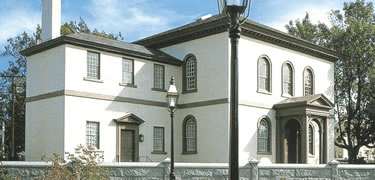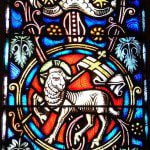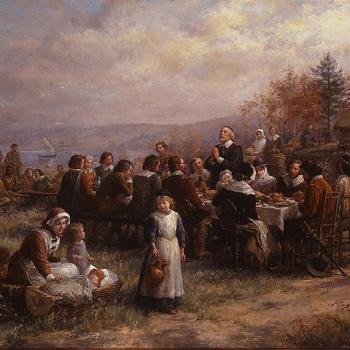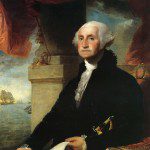
(Wikimedia Commons public domain image)
***
On Friday, the last day that I was in Newport, Rhode Island, we drove by the Touro Synagogue, the oldest synagogue in the United States. It was, alas, closed — just as it was on the previous occasion that my wife and I drove by it. (It’s still a functioning house of worship, not merely a tourism site.). The synagogue is fairly plain on the outside, though I’m told that its interior is more interesting. What makes it most important to me, though, is the role that it played in occasioning one of the most important early American statements on religious liberty and toleration.
On 17 August 1790, an official of the Hebrew congregation in Newport by the name of Moses Seixias delivered a public letter to President George Washington, who was visiting the state. In his letter, Seixas expressed his hope that the new nation would grant religious liberty and freedom of conscience to all of its citizens, even those who were not Christians. (The Constitution of the United States had been ratified just a couple of years before, on 21 June 1788, when New Hampshire became the ninth of the thirteen states to ratify it. General Washington had assumed the presidency of the new nation on 30 April 1789. The Bill of Rights, including the First Amendment with its foundational guarantee of freedom of religion, would only be ratified on 15 December 1791.)
Sir,
Permit the children of the stock of Abraham to approach you with the most cordial affection and esteem for your person and merits — and to join with our fellow citizens in welcoming you to NewPort.
With pleasure we reflect on those days — those days of difficulty, and danger, when the God of Israel, who delivered David from the peril of the sword, — shielded Your head in the day of battle: — and we rejoice to think, that the same Spirit, who rested in the Bosom of the greatly beloved Daniel enabling him to preside over the Provinces of the Babylonish Empire, rests and ever will rest, upon you, enabling you to discharge the arduous duties of Chief Magistrate in these States.
Deprived as we heretofore have been of the invaluable rights of free Citizens, we now with a deep sense of gratitude to the Almighty disposer of all events behold a Government, erected by the Majesty of the People — a Government, which to bigotry gives no sanction, to persecution no assistance — but generously affording to all Liberty of conscience, and immunities of Citizenship: — deeming every one, of whatever Nation, tongue, or language equal parts of the great governmental Machine: — This so ample and extensive Federal Union whose basis is Philanthropy, Mutual confidence and Public Virtue, we cannot but acknowledge to be the work of the Great God, who ruleth in the Armies of Heaven, and among the Inhabitants of the Earth, doing whatever seemeth him good.
For all these Blessings of civil and religious liberty which we enjoy under an equal benign administration, we desire to send up our thanks to the Ancient of Days, the great preserver of Men — beseeching him, that the Angel who conducted our forefathers through the wilderness into the promised Land, may graciously conduct you through all the difficulties and dangers of this mortal life: — And, when, like Joshua full of days and full of honour, you are gathered to your Fathers, may you be admitted into the Heavenly Paradise to partake of the water of life, and the tree of immortality.
Done and Signed by order of the Hebrew Congregation in NewPort, Rhode Island
Moses Seixas, Warden
August 17th 1790
A few days later, President Washington responded with a letter that has become something of a formative classic in the history of the United States:
Gentlemen –
While I receive, with much satisfaction, your Address replete with expressions of affection and esteem; I rejoice in the opportunity of assuring you, that I shall always retain a grateful remembrance of the cordial welcome I experienced in my visit to Newport, from all classes of Citizens.
The reflection on the days of difficulty and danger which are past is rendered the more sweet, from a consciousness that they are succeeded by days of uncommon prosperity and security. If we have wisdom to make the best use of the advantages with which we are now favored, we cannot fail, under the just administration of a good Government, to become a great and happy people.
The Citizens of the United States of America have a right to applaud themselves for having given to mankind examples of an enlarged and liberal policy: a policy worthy of imitation. All possess alike liberty of conscience and immunities of citizenship. It is now no more that toleration is spoken of, as if it was by the indulgence of one class of people, that another enjoyed the exercise of their inherent natural rights. For happily the Government of the United States, which gives to bigotry no sanction, to persecution no assistance requires only that they who live under its protection should demean themselves as good citizens, in giving it on all occasions their effectual support.
It would be inconsistent with the frankness of my character not to avow that I am pleased with your favorable opinion of my Administration, and fervent wishes for my felicity. May the children of the Stock of Abraham, who dwell in this land, continue to merit and enjoy the good will of the other Inhabitants; while every one shall sit in safety under his own vine and figtree, and there shall be none to make him afraid. May the father of all mercies scatter light and not darkness in our paths, and make us all in our several vocations useful here, and in his own due time and way everlastingly happy.
G. Washington
August 21, 1790
President Washington’s letter is a revered possession of the synagogue and is read at an annual service there.
Worthy of mention is its elegant literary style. We simply don’t write like this anymore, and, in recent decades, it has become rarer and rarer for presidential statements to be so overtly religious. Please note President Washington’s use of the verb demean, in a sense that still survives in our noun demeanor.












